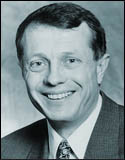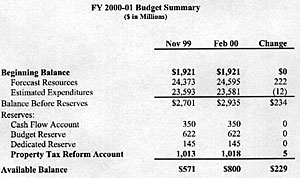Spend or Save?
by Michael Khoo
February 29, 2000
The Department of Finance is predicting the state's budget surplus will grow by an additional $229 million before the end of the two-year budget cycle in June 2001. That brings the total projected surplus to $1.8 billion. Despite Governor Ventura's insistence that most of the money be saved until next year, the news immediately touched off a round of legislative maneuvering over how to divide it between tax cuts and new spending initiatives.
THE NEW SURPLUS DOLLARS
are only a modest increase over the $1.6
billion predicted late last year, but they mark the 16th
consecutive surplus projection. And that was more than enough to prompt House
and Senate Republicans into action. Within a few hours of the official
announcement of the bigger surplus, GOP leaders gathered outside the
governor's office to deliver their message.
In the final days of the last session, the governor eventually joined Republicans in supporting a similar tax cut. But this year he says he wants to postpone any major tax or spending initiatives until the 2001 budget session. Ventura says the rush to offer tax cuts and spending packages is a product of election year politics.
Ventura has called for modest tax cuts in the form of reduced license-tab fees for cars, and new transportation spending in future budgets. But the
governor says the bulk of the surplus should be saved for property-tax reform
next year. DFLers, however, have larger appetites. Senate Majority Leader
Roger Moe says Ventura's plan is too narrowly focused, and he says the House
Republican plan returns too much to the state's wealthiest taxpayers.
The governor, however, is more likely paying
attention to advisors like state economist Tom Stinson. Stinson says the surplus
projections are based on a best-case scenario in which the state and national
economies - already breaking records for uninterrupted growth - continue to
expand. Stinson says a minor slowdown could erase the surplus projections.
by Michael Khoo
February 29, 2000
|
|
RealAudio 3.0 |
The Department of Finance is predicting the state's budget surplus will grow by an additional $229 million before the end of the two-year budget cycle in June 2001. That brings the total projected surplus to $1.8 billion. Despite Governor Ventura's insistence that most of the money be saved until next year, the news immediately touched off a round of legislative maneuvering over how to divide it between tax cuts and new spending initiatives.
| |
|
|
|
||
Sviggum: Folks, enough is enough in regards to the over-taxation, the over-collection of hard-working families, hard-working taxpayers...House Speaker Steve Sviggum says he's challenging Governor Ventura to return the entire $1.8 billion surplus through some combination of permanent and one-time tax cuts.
Sviggum: That's why we're here by the governor's office; to bring the message right here, to draw that line on the concrete right here, so that the governor can hear us and see us right outside his room.So far, the House Republicans, Senate DFLers, and Governor Ventura have agreed in principle to a roughly $500 million tax rebate. But some lawmakers want to offer more. House Republicans have proposed cutting the middle-bracket income tax rate by three-quarters of a percentage point and cutting the top and bottom brackets by a half-percentage point.
In the final days of the last session, the governor eventually joined Republicans in supporting a similar tax cut. But this year he says he wants to postpone any major tax or spending initiatives until the 2001 budget session. Ventura says the rush to offer tax cuts and spending packages is a product of election year politics.
Ventura: Their main focus isn't now based upon what's best for Minnesota. Their main focus, naturally, is, "How do I get re-elected?" And so they're going to say and do things that they think is going to support themselves getting re-elected again.
|
"This is an election year feeding frenzy."
- Governor Ventura |
Moe: The governor, as I said, wants to... His tax cut is in one area. And then he wants to spend only in one area. The House basically has a tax-reduction plan that's targeted, we think, the wrong way and is not sustainable. We think we're offering a reasonable alternative to both of those.The Senate DFL plan calls for an increase in the personal income-tax exemption by $400. It also offers reductions in tab fees and property-tax relief targeted to farmers. Moe says the total package would cost just over $250 million. Republicans say that's not nearly enough. And they say Moe isn't being specific about where he wants to increase spending and by how much he would increase it.
| |
|
|
|
||
Stinson: The risk to the forecast is not that of a recession, though the probability of a recession in 2002 is up slightly. The real risk continues to be underperforming the forecast, would not take anything dramatic to underperform the forecast.But after a string of surplus projections, legislators aren't likely to listen to cautious words from the governor's office. By the end of the session, some combination of tax cuts and spending proposals will probably land on the governor's desk.


